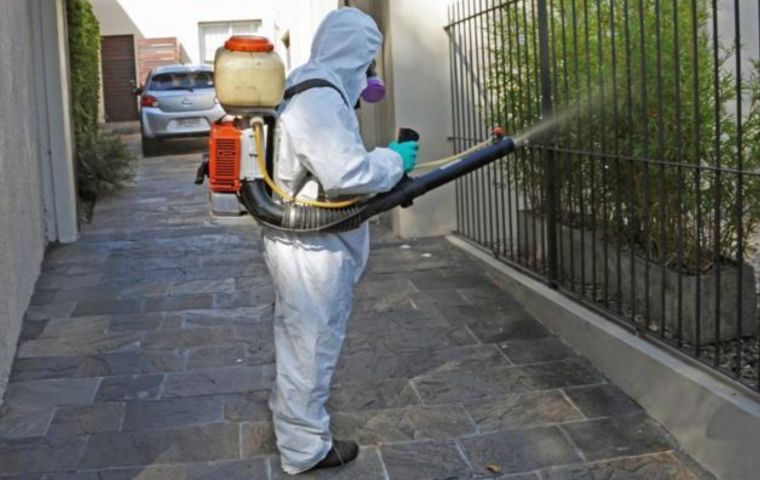MercoPress. South Atlantic News Agency
Mosquitoes invading Montevideo, not the ones carrying dengue
 Uruguayan specialists foresee an increase in the number of cases of dengue after Tourism Week
Uruguayan specialists foresee an increase in the number of cases of dengue after Tourism Week Uruguay's Health Ministry (MSP) Zoonosis and Vectors Director Gabriela Willat said Monday that “they are the flood mosquitoes, which breed in puddles and hatch at the same time.” She made those remarks as the number of dengue cases is soaring in neighboring Argentina and Brazil while an increase is expected locally following the current Tourism Week holiday, the country's lay version of the Easter Week recess.
MSP authorities, however, ruled out that the current invasion of mosquitoes in Montevideo featured the aedes aegypti variety, which transmits dengue, zika, and chikungunya.
“They are aedes, but it is not the mosquito that transmits dengue, of course, you have to protect yourself anyway, the issue of repellents is very useful, they are mosquitoes that are more active during the day, they are very aggressive, which is why they impact more on the population,” Willat also noted.
“We have already had invasions of this type, they are called flood mosquitoes, which breed in puddles and hatch all at once, this will not last long, but the important one is the aedes aegypti that must be protected with repellent and consult a doctor if we have symptoms,” she added while a new case of autochthonous dengue fever was confirmed in the Uruguayan capital.
The patient had no travel history and therefore the MSP was undertaking preventive measures to detect other cases in time. The MSP only fumigates when there are outbreaks, and in cases such as the one mentioned, they visit nearby homes, asking neighbors if there is anyone at home with symptoms, it was explained.
Willat also pointed out that the patios and backyards at the homes of those infected were being cleaned up. Monday's sanitary operation covered a nine-block radius around the place where the original case was detected.
The aedes aegypti mosquito is small, with black and white striped legs, Willat also pointed out.
Uruguayan health authorities expect an increase in cases after Tourism Week, infectiologist Zaida Arteta warned. The inoculation period can take up to five days and the same mosquito can infect several people. “The virus has a phase in the human being and another in the mosquito. The human being is the source of infection for the mosquito and when it bites another person it inoculates the virus. This takes a few days and the mosquito is infectious for several people,” she explained.
“We must try to avoid the bite of new mosquitoes; also asymptomatic people should put on repellent to avoid acquiring dengue,” she insisted.
“The most vulnerable people are at greater risk of having severe dengue, such as the very elderly, young children, pregnant women, those who have some type of chronic disease, and those who have had dengue before... are more likely to have a slightly more severe and even severe disease,” she said.




Top Comments
Disclaimer & comment rulesCommenting for this story is now closed.
If you have a Facebook account, become a fan and comment on our Facebook Page!